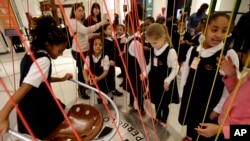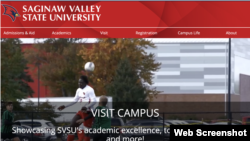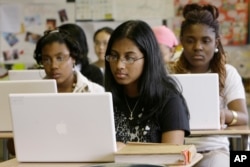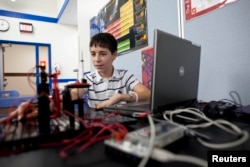Student Union
- By Charles Fern
Are Boys Better At Math? Girls With English?

Do boys perform better in math than girls? Do girls excel in reading?
The data vary.
Recent studies from Stanford University show that gender gaps in math proficiency still exist but are closing. And many factors besides gender influence how children learn, depending on their families' income and education.
Stanford looked at 260 million test scores in more than 10,000 school districts in the United States between 2008 and 2015. Researchers found:
— The math gap between genders has narrowed over the years.
— Boys outperform girls in math only slightly.
— Boys outperform girls in math in wealthy, suburban school districts.
— Girls outperform boys in math in low-income districts only slightly.
— Girls excel in English across all economic groups.
— Wealth likely plays a role in creating gender gaps.
"This study highlights that gender disparities still exist within the United States," said Erin Fahle, doctoral candidate in education policy at Stanford in northern California. "Our research is highlighting that both male and female students' educational opportunities are constrained by gender norms and stereotypes and our expectations for what they will do academically."
Overall, gaps among younger students in math and English performance are smaller than gaps among older students, Fahle told VOA. Her team looked at how parents invest resources in their children and how they speak with them.
Income factor
Family income can influence how children relate and interact with others, for example, by providing enrichment and educational activities. This can impact higher education, as well.
"Potentially, in the more affluent communities, parents are investing more in STEM [science, technology, engineering and math] opportunities in male children relative to female children," Fahle said.
Status also plays a role, according to researchers.
"The sons of 'high status' men get more years of education on average than the daughters, while the daughters of 'low status' men get more years of education on average than the sons," said Rosemary Hopcroft, a professor of sociology at the University of North Carolina at Charlotte.
This disparity between sons and daughters is not new. Two prior studies by Hopcroft, from 2005 and 2014 with colleague David O. Martin, have shown the same results.
Studies also were conducted by Boston College in 2003, the University of Pécs in Hungary and University of Liverpool in 1997 and the University of California-Davis in 1998.
Part of the reason studies differ is that conclusions about the gender gap in education are viewed differently, depending on a researcher's field of study.
"Generally, feminists usually are in favor of things that favor women. Well, this favors women, only women on one end of the socioeconomic scale, right, women from poor families," said Hopcroft. "And then it seems that boys at the top end of the scale are benefited."
"It's sort of very complicated, because it switches around, you see," she said.
Instructor bias
One study discovered "consistent evidence" that teachers give lower ratings to girls in math.
"Consistently, we see that teachers are rating girls as less capable than boys when the test is saying they are equally capable and the teacher thinks they are working equally as hard," said Joseph Cimpian, an associate professor of economics and education at New York University-Steinhardt, formerly known as the NYU School of Education.
"It's not clear why teachers hold beliefs that girls are less mathematically capable than similar boys," said Cimpian. "Teachers aren't necessarily aware of their own biases."
In addition, boys and girls have different approaches to problem-solving, and this is clear in their performances in mathematics, according to research from professors at the University of Illinois, New York University and West Chester University published in 2016.
"Boys are taught to be more of a risk-taker, and this may play out in the math classroom," said Sarah Lubienski, a mathematics education professor at Indiana University-Bloomington. Girls "dutifully follow the teacher's instructions and learn how to solve math problems by following rules, but they're less likely to score at the very top of the math achievement distribution, because of differences in problem-solving approaches."
The Stanford study may reveal a lot, but it also shows where more needs to be done, "to understand some of the phenomenons that we see," said Fahle.
See all News Updates of the Day
International students navigate financial challenges to pay US tuition

Navigating the complexities of higher education is challenging for many, but for international students, the financial hurdles can be particularly daunting.
Faced with skyrocketing tuition and fees, limited access to financial aid, and the instability of scholarships, many international students struggle to sustain their academic dreams.
Funding problems can lead some students to withdraw their college applications, as Alpha Daramy Sesay of Sierra Leone did. He abandoned his dream of studying journalism at the University of Maryland.
"I've applied to almost three universities in the past two years, and the board members were thrilled with my purpose statement and approved my application unambiguously," Sesay told VOA News. "However, I was unable to register due to the funding bottleneck, and the deadline for these offers has just lapsed."
Sesay had meticulously planned his move to the U.S., even stopping his scholarship search when a family member promised financial support. When Sesay was admitted to his dream school, however, the family support fell through, leaving him scrambling for scholarships that didn't cover all expenses.
Reflecting on his ordeal, Sesay advises future international students to seek scholarships and consult with school advisers early to avoid similar setbacks.
Talia Popovski, senior director of International Student Services at Valencia College in Orlando, Florida, suggests starting at a community college to save on tuition costs.
"Primarily, we have international students pursuing associate degrees," she said. "This is a major way for them to save money compared to going directly to a university."
Popovski emphasized the benefits of community colleges as pathways to universities, with many international students pursuing associate degrees before transferring to earn their bachelor's degrees. She also highlighted the role of on-campus work in alleviating financial burdens, suggesting institutional work-study programs as options.
According to NAFSA: Association of International Educators, a nonprofit dedicated to international education and exchange, international students are ineligible for federal work-study positions, necessitating discussions with advisers about employment eligibility. Popovski also mentioned that universities offer part-time jobs through their human resources departments, including paid internships, which provide additional financial support for education.
Student secures honor scholarship
Guilherme Lucas Mannarino, who received his associate degree from Valencia College, turned down 32 esports scholarships to study in Florida.
"I came to the United States [from Brazil] when I was 18 years old," Mannarino recalled. "I rejected all the scholarships that I acquired through esports, playing Fortnite."
Mannarino, who majored in finance at Valencia College, exemplified proactive planning in overcoming financial challenges.
Despite declining the esports scholarships, Mannarino secured an honor scholarship at Valencia College covering 50% of his tuition. He attributed his financial stability to planning ahead, staying on top of his academics, and acquiring an on-campus job.
To supplement his income, he conducted workshops advising Brazilian students on esports scholarships, allowing him to cover living expenses by finding roommates through social media.
"I was able to find a roommate on social media before coming to the U.S., which is a great way to save money," he said. "A year later, we had another roommate, which made my living costs cheaper, which is honestly the best way to save money in the U.S."
Tips for overcoming financial hurdles
Kadiatou Sow, from Conakry, Guinea, is studying at Saginaw Valley State University in University Center, Michigan.
"Managing the high cost of tuition and living expenses while studying abroad involves a strategic approach," Sow said. "I prioritize securing scholarships and grants tailored for international students to alleviate tuition expenses and sometimes cover living costs. Supplementing this with part-time work both on campus and in the local community provides a steady income for daily necessities."
She encourages fellow international students to balance work and studies effectively, understand visa work-hour regulations, and seek university support for financial aid options.
"Seeking guidance from university support services and staying informed about financial aid options are essential strategies for navigating these challenges successfully," Sow said.
Three ways international students can overcome financial hurdles:
1. Community college enrollment: Begin with an associate degree at a community college to save significantly on tuition costs before transferring to a university for a bachelor's degree.
2. On-campus employment: Explore institutional work-study programs and university job boards for part-time employment opportunities that complement studies and provide financial support.
3. Proactive financial planning: Save money before arriving in the U.S., seek scholarships tailored for international students, and explore paid internship opportunities to supplement income.
While financial obstacles are daunting, international students can achieve their academic aspirations through strategic planning, diligent scholarship pursuit and leveraging on-campus resources, advisers say.
By adopting proactive financial strategies and staying resilient, they can successfully navigate the challenges of financing their education abroad, ensuring a path to academic success and personal growth.
- By VOA News
Indian newspaper offers tips for US-bound students

Telangana Today, a newspaper in India, offers a list of tips and resources for students planning to study in the United States.
Among them:
- Prepare for your travel to the U.S., making sure to gather all necessary documents, including your passport and visa.
- Be sure to attend orientations.
- By VOA News
Michigan State international students get their own space

Michigan State University in East Lansing, Michigan, is setting aside a space in the International Center for international students.
Nidal Dajani, vice president of the school's International Student Association, said that the club plans to use the space to host events and hopes to collaborate with other student groups.
- By Dylan Ebs
International students find community during Pride Month

For LGBTQ+ international students, Pride Month, observed in June, is a unique time to reflect.
They hold on to multiple identities — both their LGBTQ+ identity and their cultural background — but coming to terms with them is not always easy.
For graduate student David Zhou, these identities can feel conflicting as transgender rights in China remain a controversial issue and spaces for LGBTQ people close. Zhou, 25, is transgender and pursuing an education in the STEM field at an urban university in the Midwestern United States.
VOA is using a pseudonym for Zhou’s first name and is not naming his university to protect his identity due to safety concerns back home in China. Zhou is not open about his transgender identity to his family.
During Pride Month, Zhou said he attended multiple LGBTQ+ events in his community and is surrounded by a supportive group of LGBTQ+ students who can relate to his experiences. But he’s not open about his identity to everyone on campus and said he doesn’t disclose his preferred pronouns to everyone to avoid transphobic comments.
“I feel like I have to make some judgments of the character of that person to see if they’re a good person to disclose [my identity] to,” Zhou said.
Zhou’s Pride Month celebrations included attending local markets with LGBTQ+ vendors and hanging out with his LGBTQ+ friends.
“They normalized being trans and for a long time I feel like trans identity is, should I say a vulnerability, brings me fear and worrying about discrimination, but having those events are helpful because it allowed me to see that queer people could just [live] openly,” he said.
At social events where few international students are present, Zhou said it can be tough to fit in.
“There's a lot of times like when they were talking about things I kind of, don't really understand, mostly because I kind of lack some background experience or knowledge,” he said.
Zhou said he is not aware of specific groups for LGBTQ+ international students at his university, but said international students are more prevalent in graduate programs and therefore find representation in organizations for LGBTQ+ graduate students.
In China, transgender individuals must obtain consent from an “immediate family member,” even for adults hoping to transition, which critics say limits the autonomy of transgender individuals while supporters say the policy protects doctors from violence by upset parents.
Struby Struble, a former coordinator of the University of Missouri LGBTQ+ Resource Center, told NAFSA: Association of International Educators in 2015 that LGBTQ+ international students face a “double barrier” on campus.
“With their international student friends, they feel isolated because they’re the LGBT one,” she said. “But then among the LGBT students on campus, they feel isolated because they’re the international one.”
Nick Martin, associate director of the Q Center, Binghamton University’s LGBTQ+ student support office, said when international students tour the center, there’s often a sense of hesitation as they enter a type of space that may not be present in their home country.
“I compare that to a year in after they've come into the space, they've again, maybe come to some of our events, they've got more connected,” he said.
Martin said graduate students have a unique interest in the Q Center as they may use the office for research and advocacy purposes that align with their studies.
“For older students, there may be hesitancy in a different way, but I think it's more in the vein of they want to do some of the advocacy work,” he said.
Martin said he thinks about how both his office and BU’s international student office can support students who come from countries with few — if any — protections for LGBTQ+ individuals.
“It's been a learning process of what those students really need, but I think I've kind of learned that a lot of students are just looking for the safe space that we offer,” Martin said.
- By VOA News
International students discuss US campus culture shock

International students at De Anza College in Cupertino, California, talked about culture shock in an article in La Voz News, the student newspaper.
"It felt like a major culture shock. Everything was so different, from academics to mannerism," said a student from Mexico.
Read the full story here.








